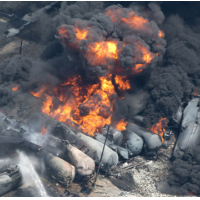Outdated Freight Train Cars Blamed for Explosions…with more to Come
 Derailment and explosion of tank cars carrying crude oil in Quebec, 2013 (photo: Paul Chiasson, Canadian Press/AP)
Derailment and explosion of tank cars carrying crude oil in Quebec, 2013 (photo: Paul Chiasson, Canadian Press/AP)
The increase in U.S. domestic oil production has meant more crude being transported by rail in outdated tankers considered a safety hazard, which has contributed to the recent rash of train accidents.
Five major derailments in the last five years have all involved the DOT-111 tank car, which has been in use since the 1960s. Experts say the tankers suffer from multiple safety flaws, making them the railcar equivalent of the Ford Pinto, the 1970s era automobile made famous for its propensity to explode during collisions.
Despite the problems posed by the DOT-111’s use, the industry continues to employ 200,000 of them, with nearly 80,000 carrying crude oil.
To make matters worse, most of the petroleum loaded in the tank cars comes from the Bakken oil fields in North Dakota, which produces a variety of oil that’s highly flammable due in part to its propane and methane content.
Deborah Hersman, the former chair of the National Transportation Safety Board, told Congress last month that the DOT-111’s design flaws “create an unacceptable public risk,” according to Mother Jones.
Rail accidents in North Dakota, Illinois, Alabama, Virginia and Canada have demonstrated the danger of moving so much oil via a dangerous conveyance. But the federal government has not been willing to order the removal of the DOT-111 from service.
Instead, the U.S. Department of Transportation merely advised oil companies to use the best cars available for such shipments. It also issued a new “emergency order” requiring railroads to inform state crisis managers of large shipments of Bakken oil moving through their jurisdictions. Additionally, railroads must provide local emergency responders with contact information for at least one person who has knowledge of the freight cars’ contents. But such notice won’t stop accidents from happening, or even reduce the infernos that erupt when the tank cars explode.
Canada, with its pressing need to move its tar sands oil to market, decided enough was enough and ordered the DOT-111 cars off its railways by 2017.
Last year was particularly bad for railway accidents involving oil, with more oil spilled in 2013 than all previous years combined going back to 1971.
-Noel Brinkerhoff
To Learn More:
Why Do These Tank Cars Carrying Oil Keep Blowing Up? (by Michael Robbins, Mother Jones)
PHMSA to DOT-111 Defender: Justify Bakken Testing (by David Thomas, Railway Age)
The Government Takes a Weak Stab at Making Oil Trains Safer (by Matthew Phillips, Bloomberg Businessweek)
Runaway Train: The Reckless Expansion of Crude-by-Rail in North America (Oil Change International) (pdf)
More Oil Spilled from Trains Last Year than in Previous 37 Years Combined (by Noel Brinkerhoff, AllGov)
Brown Budget Anticipates Surge in Inland Oil Spills from Out-of-State Rail Transports (by Ken Broder, AllGov California)
- Top Stories
- Unusual News
- Where is the Money Going?
- Controversies
- U.S. and the World
- Appointments and Resignations
- Latest News
- Trump Renames National Football League National Trump League
- Trump to Stop Deportations If…
- Trump Denounces World Series
- What If China Invaded the United States?
- Donald Trump Has a Mental Health Problem and It Has a Name






Comments